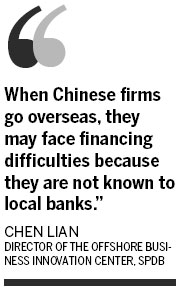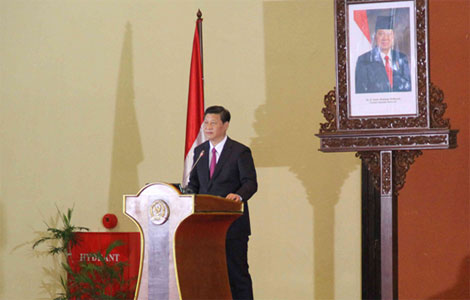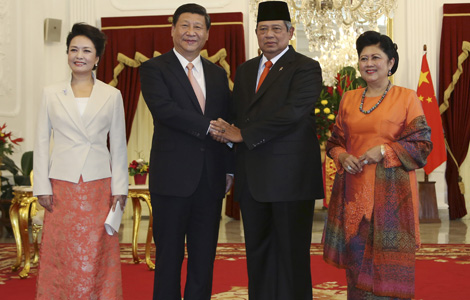ASEAN yuan use widens
Updated: 2013-10-03 22:22
By He Wei in Nanning (China Daily)
|
||||||||
Chinese banks are poised to widen the use of the yuan among the Association of Southeast Asian Nations by expanding the scope of currency convertibility and conducting offshore trials of the currency.
The moves answer the latest call made by Premier Li Keqiang to implement bilateral and regional local-currency swap agreements to safeguard financial and economic stability in the region.
Bank of China Ltd, the country's most prolific foreign exchange provider, has enabled conversion of the Indonesian rupiah with the yuan across its branches in the Guangxi Zhuang autonomous region.
One yuan was equal to 1,814.88 Rp upon the maiden exchange day on Wednesday.
This is the sixth ASEAN member with a currency that can realize cash convertibility in China, following Singapore, Thailand, the Philippines, Vietnam and Malaysia.
|
A promoter prepares a traditional drink on Tuesday at the Malaysia booth at the China-ASEAN Expo in Nanning, the Guangxi Zhuang autonomous region. The expo opened on Wednesday. Huo Yan / China Daily |
The bank's Guangxi branch may leverage its geographic proximity to ASEAN markets and serve soaring two-way trade and investment demands, said Yang Shihua, the bank's chief operating officer.
Regional financial collaboration gained added momentum when Shanghai Pudong Development Bank Co Ltd inaugurated its offshore business innovation center in Nanning, the capital city of Guangxi, to explore best practices in cross-border yuan settlements.
With SPDB being one of the four banks that obtained the offshore yuan business license, the testing of the water is designed to tap into Chinese businesses that have financing needs in ASEAN-related projects, Ji Guangheng, executive vice-president of the lender, told China Daily.
"When Chinese firms go overseas, they may face financing difficulties because they are not known to local banks. But so long as the firm holds a parent company guarantee, domestic banks may skirt potential risks and feed their funding needs," said Chen Lian, head of the center.
SPDB set up a sister center two years ago in Xiamen, Fujian province, to facilitate rocketing cross-Straits business transactions. The current center is set to sort out the uniqueness of the ASEAN market, she noted.
Beijing has so far clinched four swap agreements among ASEAN members to prevent trade and investment from foreign exchange losses and lessen dependence on a third currency.
It is also an active advocator of the multilateralization of the Chiang Mai Initiative, a regional currency swap arrangement that seeks to manage short-term liquidity problems.
The volume of bilateral swap agreements with local banks has reached 1.4 trillion yuan ($228 billion), while yuan-denominated cross-border settlements between China and the ASEAN reached 1.12 trillion yuan by June of this year, said Yi Gang, deputy governor of the People's Bank of China and head of the State Administration of Foreign Exchange.
Yi urged cross-border trade and investment settlements in local currencies to proliferate to all ASEAN members, which effectively lowers transaction costs and facilitates liquidity.

The presence of Chinese financial institutions has diversified Cambodia's infant financial market and helped the country fulfill many infrastructure projects, said Chea Chanto, governor of the National Bank of Cambodia.
"Two commercial banks - the Bank of China and the Industrial and Commercial Bank of China Ltd - started operations two years ago. Their good performances and the close collaboration between the two countries' central banks provide opportunities and confidence to draw Chinese investors to come to Cambodia," said Chea Chanto.
The State-backed China Development Bank has provided loans to aid the construction of roads, irrigation systems and energy sectors.
Cambodia has yet to achieve settlements in yuan, but he said they have taken preliminary steps by opening yuan accounts in local banks. He is optimistic to realize the goal "very soon".
Major banks in Cambodia have witnessed rising demand for yuan settlements, said Niu Jianjun, head of ICBC's Phnom Penh branch, who maintains a close relationship with local banks.
But there remain hurdles, given its history with US dollar settlement, as well as the relatively small volume of imports from China, which gives it less of an incentive to use the yuan.
"The ongoing Trans-Pacific Partnership Agreement and the trans-Atlantic trade agreement negotiations both intend to set the stage for a Western-dominated trade agenda. There is no way out but to strengthen our financial ties," said Han Mingzhi, chairman of the board of supervisors of China Merchants Bank Ltd.
Yi warned that the exit of quantitative easing policies may result in a wave of capital outflows and is likely to cause foreign exchange turbulence.
hewei@chinadaily.com.cn
(China Daily USA 10/03/2013 page11)

 President Xi gives speech to Indonesia's parliament
President Xi gives speech to Indonesia's parliament
 268 fishermen trapped by Typhoon Wutip saved
268 fishermen trapped by Typhoon Wutip saved
 Little room for growth among high-end hotels
Little room for growth among high-end hotels
 Diplomatic game
Diplomatic game
 The first place to be called the 'Middle Kingdom'
The first place to be called the 'Middle Kingdom'
 Lavish wedding ebbs under luxury ban
Lavish wedding ebbs under luxury ban
 Xi pledges to boost ties with Indonesia
Xi pledges to boost ties with Indonesia
 Travel becomes passport to a new look
Travel becomes passport to a new look
Most Viewed
Editor's Picks

|

|

|

|

|

|
Today's Top News
Obama, congressional leaders still deadlocked
A community of common destiny
Russian embassy in Tripoli attacked
Iran has proposal for nuclear deal
Trending news across China
The luxury of travel
US novelist Tom Clancy dies at 66
China, Indonesia renew currency swap deal
US Weekly

|

|






